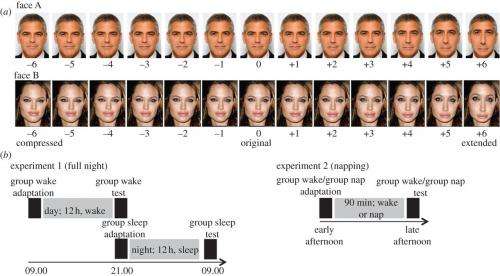Stimuli and design. (a) The range of stimuli from highly compressed (k = −6) to highly extended (k = +6) created from a frontal view image (original) of George Clooney (face A) and Angelina Jolie (face B). (b) Design of the study. Credit: (c) Proceedings of the Royal Society B, doi: 10.1098/rspb.2013.1698
(Medical Xpress)—A team of researchers at University College in London has conducted a study that suggests that visual adaptation is enhanced by sleep and might also be tied to memory. In their paper published in Proceedings of the Royal Society B, the team describes their study as well as observed results and possible interpretations.
Visual adaptation is a technique the brain uses to maximize efficiency. Images, such as faces that are seen multiple times become routine, and because of that the brain doesn't have to work as hard at recognizing them—when they see them, retinal neurons fire less frequently and the visual cortex doesn't become as excited. This allows the brain to focus more on other things it has not seen before. In this new effort, the researchers set out to discover whether this process is changed by sleep much the same way sleep is involved in memory retention.
To find out, they set up an experiment where volunteers were asked to look at pictures of celebrities with their faces distorted by extension on a computer screen. Prior research has shown that when a familiar face is seen in a new way, it must work to re-recognize and adapt to it. Afterwards, some of the volunteers were allowed to sleep for a period of time, while another group was not. Then, all of the volunteers where shown photographs of people, some of whom were the celebrities they'd looked at earlier, with a twist—some showed the celebrities without distortion, some with and some with a different type of distortion (compressed). When viewing the pictures, the volunteers were asked to press buttons corresponding to normal, extended distortion, or compressed distortion.
In analyzing the results, the researchers found that the volunteers that had been allowed to sleep were more likely to report the distorted images as being normal, meaning their brains had adapted to the new images of them.
To make sure that the results of the experiment had not come about due to other factors, such as time of day, the researchers ran the experiment again varying the times the experiment was run and when the volunteers were allowed to sleep. They found the same result. They also noted that the length of time volunteers spent in REM sleep for both experiments had an impact on visual adaptation rates. They further theorize that visual adaptation, because it's impacted by sleep, might be tied to memory retention.
More information: Sleep facilitates long-term face adaptation, Published 28 August 2013 DOI: 10.1098/rspb.2013.1698
Abstract
Adaptation is an automatic neural mechanism supporting the optimization of visual processing on the basis of previous experiences. While the short-term effects of adaptation on behaviour and physiology have been studied extensively, perceptual long-term changes associated with adaptation are still poorly understood. Here, we show that the integration of adaptation-dependent long-term shifts in neural function is facilitated by sleep. Perceptual shifts induced by adaptation to a distorted image of a famous person were larger in a group of participants who had slept (experiment 1) or merely napped for 90 min (experiment 2) during the interval between adaptation and test compared with controls who stayed awake. Participants' individual rapid eye movement sleep duration predicted the size of post-sleep behavioural adaptation effects. Our data suggest that sleep prevented decay of adaptation in a way that is qualitatively different from the effects of reduced visual interference known as 'storage'. In the light of the well-established link between sleep and memory consolidation, our findings link the perceptual mechanisms of sensory adaptation—which are usually not considered to play a relevant role in mnemonic processes—with learning and memory, and at the same time reveal a new function of sleep in cognition.
Journal information: Proceedings of the Royal Society B
© 2013 Phys.org





















